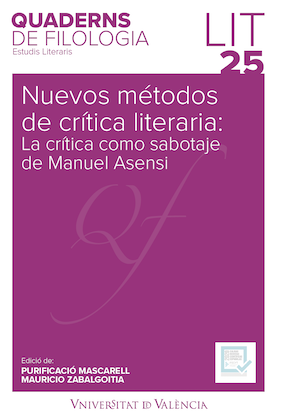L'oracle sabotejat: ideologia i comportaments guiats en la comèdia àuria
DOI:
https://doi.org/10.7203/qdfed.25.18995Paraules clau:
teatre, poder, oracles, sabotatge, Segle d'Or. Resum
Resum
Aquest article proposa una anàlisi del gènere teatral auri en un dels seus mecanismes retòrics amb major capacitat performativa: la funció dramàtica oracular a partir de la qual una veu superior –siga un oracle, un somni, una veu interior o qualsevol altra possessió transitòria– és escoltada simultàniament pel receptor-personatge i pel receptor-públic. El dramaturg jerarquitza així l'heterogeneïtat de discursos presents en el microcosmos de la comèdia i, oferint un sil·logisme epistemològic, incita a actuar directament al primer i metonímicament al segon. La crítica entesa com a sabotatge ofereix unes eines crítiques que permeten desemmascarar els secrets d'aquests recursos oraculars que imposen un model de món als destinataris del major espectacle de masses de la primerenca modernitat.
 Descàrregues
Descàrregues
Descàrregues
Publicades
Com citar
-
Resum503
-
PDF (Español)333
Número
Secció
Llicència
 Este obra está bajo una licencia de Creative Commons Reconocimiento-NoComercial-SinObraDerivada 4.0 Internacional.
Este obra está bajo una licencia de Creative Commons Reconocimiento-NoComercial-SinObraDerivada 4.0 Internacional.
Tots els documents inclosos a OJS són d'accés lliure i propietat dels seus autors i/o institucions editores, i per tant, qualsevol acte de reproducció, comercialització, comunicació pública o transformació total o parcial necessita el consentiment exprés i escrit d'aquests.
________
Authors who publish with this journal agree to the following terms:
- Authors retain copyright and grant the journal right of first publication with the work simultaneously licensed under a Creative Commons Attribution License that allows others to share the work with an acknowledgement of the work's authorship and initial publication in this journal.
- Authors are able to enter into separate, additional contractual arrangements for the non-exclusive distribution of the journal's published version of the work (e.g., post it to an institutional repository or publish it in a book), with an acknowledgement of its initial publication in this journal.
- Authors are permitted and encouraged to post their work online (e.g., in institutional repositories or on their website) prior to and during the submission process, as it can lead to productive exchanges, as well as earlier and greater citation of published work (See The Effect of Open Access).




